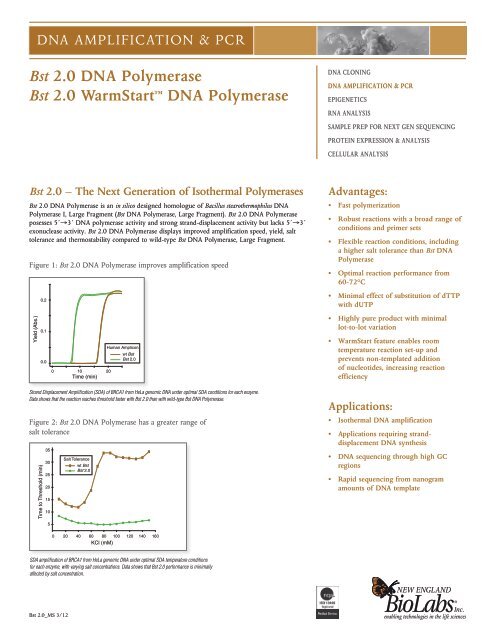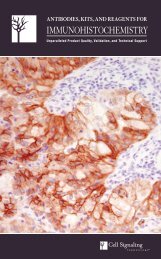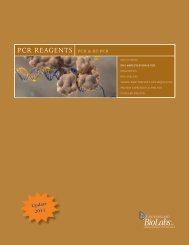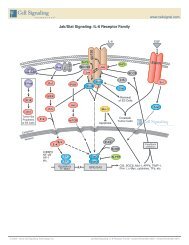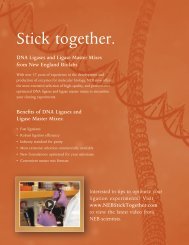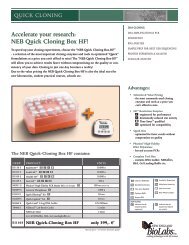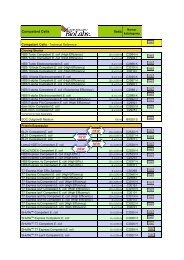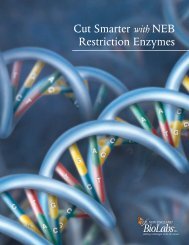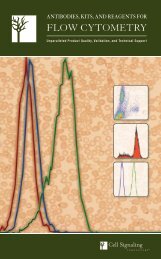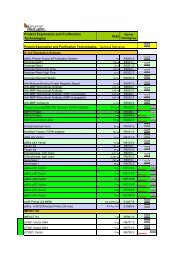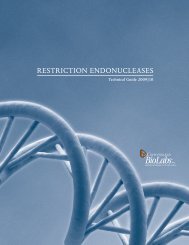Bst 2.0 MS_Euro_mark.. - Lab-JOT
Bst 2.0 MS_Euro_mark.. - Lab-JOT
Bst 2.0 MS_Euro_mark.. - Lab-JOT
You also want an ePaper? Increase the reach of your titles
YUMPU automatically turns print PDFs into web optimized ePapers that Google loves.
DNA Amplification & PCR<br />
<strong>Bst</strong> <strong>2.0</strong> DNA Polymerase<br />
<strong>Bst</strong> <strong>2.0</strong> WarmStart DNA Polymerase<br />
DNA Cloning<br />
DNA Amplification & PCR<br />
Epigenetics<br />
RNA Analysis<br />
Sample Prep for Next Gen Sequencing<br />
Protein Expression & Analysis<br />
Cellular Analysis<br />
<strong>Bst</strong> <strong>2.0</strong> – The Next Generation of Isothermal Polymerases<br />
<strong>Bst</strong> <strong>2.0</strong> DNA Polymerase is an in silico designed homologue of Bacillus stearothermophilus DNA<br />
Polymerase I, Large Fragment (<strong>Bst</strong> DNA Polymerase, Large Fragment). <strong>Bst</strong> <strong>2.0</strong> DNA Polymerase<br />
posesses 5´→3´ DNA polymerase activity and strong strand-displacement activity but lacks 5´→3´<br />
exonuclease activity. <strong>Bst</strong> <strong>2.0</strong> DNA Polymerase displays improved amplification speed, yield, salt<br />
tolerance and thermostability compared to wild-type <strong>Bst</strong> DNA Polymerase, Large Fragment.<br />
Figure 1: <strong>Bst</strong> <strong>2.0</strong> DNA Polymerase improves amplification speed<br />
Yield (Abs.)<br />
Strand Displacement Amplification (SDA) of BRCA1 from HeLa genomic DNA under optimal SDA conditions for each enzyme.<br />
Data shows that the reaction reaches threshold faster with <strong>Bst</strong> <strong>2.0</strong> than with wild-type <strong>Bst</strong> DNA Polymerase.<br />
Figure 2: <strong>Bst</strong> <strong>2.0</strong> DNA Polymerase has a greater range of<br />
salt tolerance<br />
Time to Threshold (min)<br />
0.2<br />
0.1<br />
0.0<br />
35<br />
30<br />
25<br />
20<br />
15<br />
10<br />
0 10 20<br />
Time (min)<br />
Salt Tolerance<br />
wt <strong>Bst</strong><br />
<strong>Bst</strong> <strong>2.0</strong><br />
Human Amplicon<br />
wt <strong>Bst</strong><br />
<strong>Bst</strong> <strong>2.0</strong><br />
Advantages:<br />
• Fast polymerization<br />
• Robust reactions with a broad range of<br />
conditions and primer sets<br />
• Flexible reaction conditions, including<br />
a higher salt tolerance than <strong>Bst</strong> DNA<br />
Polymerase<br />
• Optimal reaction performance from<br />
60-72°C<br />
• Minimal effect of substitution of dTTP<br />
with dUTP<br />
• Highly pure product with minimal<br />
lot-to-lot variation<br />
• WarmStart feature enables room<br />
temperature reaction set-up and<br />
prevents non-templated addition<br />
of nucleotides, increasing reaction<br />
efficiency<br />
Applications:<br />
• Isothermal DNA amplification<br />
• Applications requiring stranddisplacement<br />
DNA synthesis<br />
• DNA sequencing through high GC<br />
regions<br />
• Rapid sequencing from nanogram<br />
amounts of DNA template<br />
5<br />
0 20 40 60 80 100 120 140 160<br />
KCl (mM)<br />
SDA amplification of BRCA1 from HeLa genomic DNA under optimal SDA temperature conditions<br />
for each enzyme, with varying salt concentrations. Data shows that <strong>Bst</strong> <strong>2.0</strong> performance is minimally<br />
affected by salt concentration.<br />
<strong>Bst</strong> <strong>2.0</strong>_<strong>MS</strong> 3/12<br />
<strong>Bst</strong> <strong>2.0</strong> <strong>MS</strong>_<strong>Euro</strong>.indd 1 18.06.12 12:14
DNA Amplification & PCR<br />
<strong>Bst</strong> <strong>2.0</strong> WarmStart DNA Polymerase<br />
The WarmStart feature of <strong>Bst</strong> <strong>2.0</strong> DNA Polymerase is unique among isothermal polymerases. Like<br />
“Hot Start” PCR polymerases, this feature prevents activity at temperatures below the optimal reaction<br />
temperature. This enables room temperature reaction set up and minimizes undesirable reaction<br />
products, thereby increasing reaction efficiencies.<br />
In contrast to chemical modifications or antibodies commonly used with hot start PCR polymerases,<br />
NEB’s <strong>Bst</strong> <strong>2.0</strong> WarmStart DNA Polymerase utilizes aptamer technology. Aptamers are<br />
extensively modified, unique oligonucleotides which bind to the polymerase through non-covalent<br />
interactions, inhibiting activity at non-permissive temperatures (< 50°C). Additionally, no separate<br />
activation step is required for <strong>Bst</strong> <strong>2.0</strong> WarmStart DNA Polymerase.<br />
While standard formulations of <strong>Bst</strong> DNA polymerase and homologs add non-templated nucleotides<br />
to substrate during room temperature reaction setup, this undesirable activity is eliminated in this<br />
WarmStart version.<br />
Figure 3: WarmStart feature enables room temperature setup<br />
Time to Threshold (min)<br />
35<br />
30<br />
25<br />
20<br />
15<br />
<strong>Bst</strong> DNA Polymerase<br />
no pre-incubation<br />
<strong>Bst</strong> DNA Polymerase<br />
2 hrs 25°C<br />
Time to Threshold (min)<br />
5.5<br />
5.4<br />
5.3<br />
5.2<br />
5.1<br />
5.0<br />
4.9<br />
<strong>Bst</strong> <strong>2.0</strong><br />
no pre-incubation<br />
<strong>Bst</strong> <strong>2.0</strong><br />
2 hrs@25°C<br />
Time to Threshold (min)<br />
6.8<br />
6.4<br />
6.0<br />
5.6<br />
<strong>Bst</strong> <strong>2.0</strong> WarmStart<br />
no pre-incubation<br />
<strong>Bst</strong> <strong>2.0</strong> WarmStart<br />
2 hrs@25°C<br />
10<br />
2 3 4 5<br />
log (copies HeLa DNA)<br />
4.8<br />
4.7<br />
2 3 4 5<br />
log (copies HeLa DNA)<br />
5.2<br />
2 3 4 5<br />
log (copies HeLa DNA)<br />
For <strong>Bst</strong> DNA Polymerase and <strong>Bst</strong> <strong>2.0</strong>, incubation of the sample at room temperature before beginning the SDA assay results in variable performance. For <strong>Bst</strong> <strong>2.0</strong> WarmStart, extended pre-assay incubation at room temperature<br />
does not affect performance. The different scales highlight the increased reaction speed with <strong>Bst</strong> <strong>2.0</strong> and <strong>Bst</strong> <strong>2.0</strong> WarmStart DNA Polymerases over wild-type <strong>Bst</strong> DNA Polymerase.<br />
Figure 4: Consistency of purity between lots of <strong>Bst</strong> <strong>2.0</strong><br />
µg protein 20 4 2 1 0.5 0.25 0.13 0.063 0.031 M µg protein 20 4 2 1 0.5 0.25 0.13 0.063 0.031 M µg protein 20 4 2 1 0.5 0.25 0.13 0.063 0.031 M<br />
Amount of protein loaded for 3 different lots is indicated in the above gels, Marker M is the Prestained Protein Marker (NEB #P7708).<br />
Ordering Information<br />
Product NEB # SIZE<br />
<strong>Bst</strong> <strong>2.0</strong> DNA Polymerase M0537S/L/M 1,600/8,000/8,000 units<br />
<strong>Bst</strong> <strong>2.0</strong> WarmStart DNA Polymerase M0538S/L/M 1,600/8,000/8,000 units<br />
companion product<br />
Isothermal Amplification Buffer Pack B0537S 6.0 ml<br />
WAR<strong>MS</strong>TART is a trade<strong>mark</strong> of New England Biolabs, Inc.<br />
New England Biolabs (UK) Ltd.<br />
www.neb.uk.com<br />
New England Biolabs France<br />
www.neb-online.fr<br />
www.neb.com<br />
New England Biolabs GmbH, Germany<br />
www.neb-online.de<br />
For a complete list of international offices and distributors, please visit www.neb.com<br />
<strong>Bst</strong> <strong>2.0</strong> <strong>MS</strong>_<strong>Euro</strong>.indd 2 18.06.12 12:14


